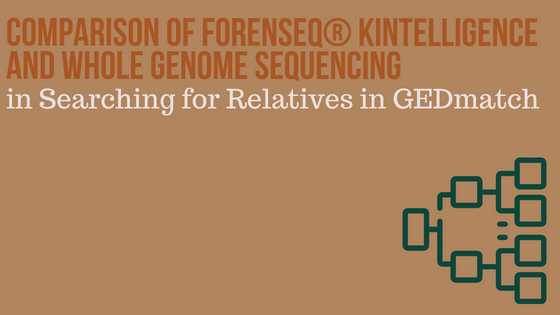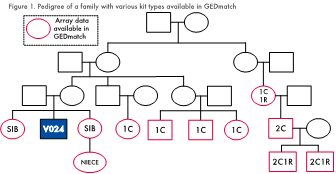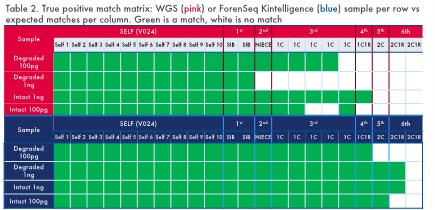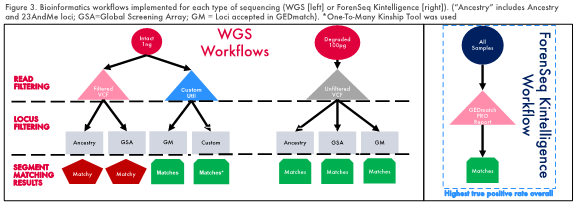Today’s blog is written by guest bloggers S.M. Radecke1, J. Antunes1, A. Bormans2, G. Padmabandu1, K.M. Stephens1
Affiliations: 1Verogen, A QIAGEN Company, San Diego, CA USA; 2Gene By Gene, Houston, TX USA
GEDmatch is an important investigative tool for law enforcement, particularly for cold cases and UHR. Several types of sequencing data can be uploaded, including microarray, whole genome sequencing (WGS), and Verogen’s ForenSeq® Kintelligence.
We compared the performance of WGS and Kintelligence in identifying true relationships in GEDmatch. We sequenced the DNA from a member of a large family that contains up to 6th degree relationships using WGS and Kintelligence (Figure 1). The samples included were degraded and intact with inputs of 1ng and 100pg. For WGS data, we utilized the One-To-Many Segment Matching tool in GEDmatch to search for relatives in the pedigree. For Kintelligence we utilized the One-To-Many Kinship tool.
We demonstrated that WGS processing requires a large amount of bioinformatics expertise, and each sample required a different bioinformatics workflow to maximize true positives and minimize false positives (Figure 3). This approach is not reproducible nor ideal if standard protocols must be in place for sample processing. Furthermore, although WGS returned a high number of SNPs typed, only a few of the known relatives were matched (Table 2).
Alternatively, the Kintelligence workflow required no bioinformatics expertise, and the same workflow was applied to every sample (Figure 3). This is because all analysis is contained within the Universal Analysis Software (UAS). All samples returned >9000 SNPs typed (of 10230 total SNPs targeted in the assay) and matched all known relationships up to 4th degree. Additionally, the Intact 1ng and 100pg samples matched one of the two 6th degree relationship (Table 2).
Overall, the Kintelligence workflow is easier to use, is reproducible, and returns the highest number of true positives and very low false positives. And, disease/medically-informed SNPs were excluded from the Kintelligence assay. These markers would need to be removed bioinformatically from WGS data.
Some investigators working on cases that have very low amounts of DNA left and/or the DNA is degraded have heard that WGS is the best option for their sample. This is because it is assumed that WGS will get the most out of this type of sample. It’s assumed that with more data, the more true matches will be returned with querying GEDmatch. However, the amount of bioinformatics required to process the sample is often overlooked. Additionally, performance of WGS data in identifying true relationships in GEDmatch is not well-established and often comes from word of mouth. Conversely, Kintelligence was designed specifically for forensic samples, has a stream-lined workflow that requires no bioinformatics knowledge, and given high quality data, can match up to 5th degree relationships.
I wanted to provide a comprehensive overview of how WGS and Kintelligence compared using a known pedigree with distant relationships so investigators can make an informed decision about their sample based on the funding and expertise available.
As an employee of Verogen (now a QIAGEN Company) in the R&D department, I will be contributing product development of new, cutting edge products and continuing to improve our existing products, including GEDmatch. View the full poster.
WOULD YOU LIKE TO SEE MORE ARTICLES LIKE THIS? SUBSCRIBE TO THE ISHI BLOG BELOW!





